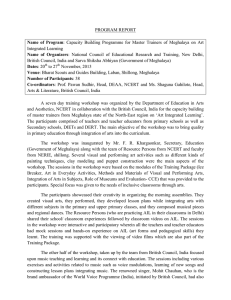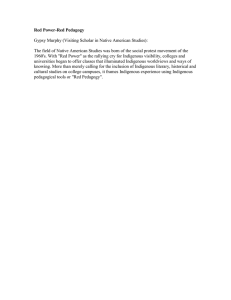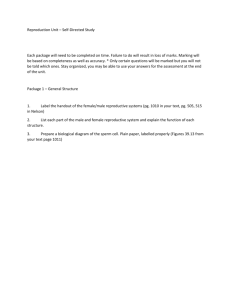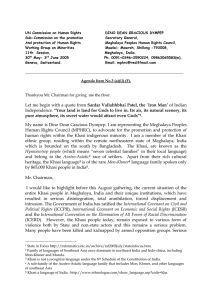Institute of Development Studies evidence submission
advertisement
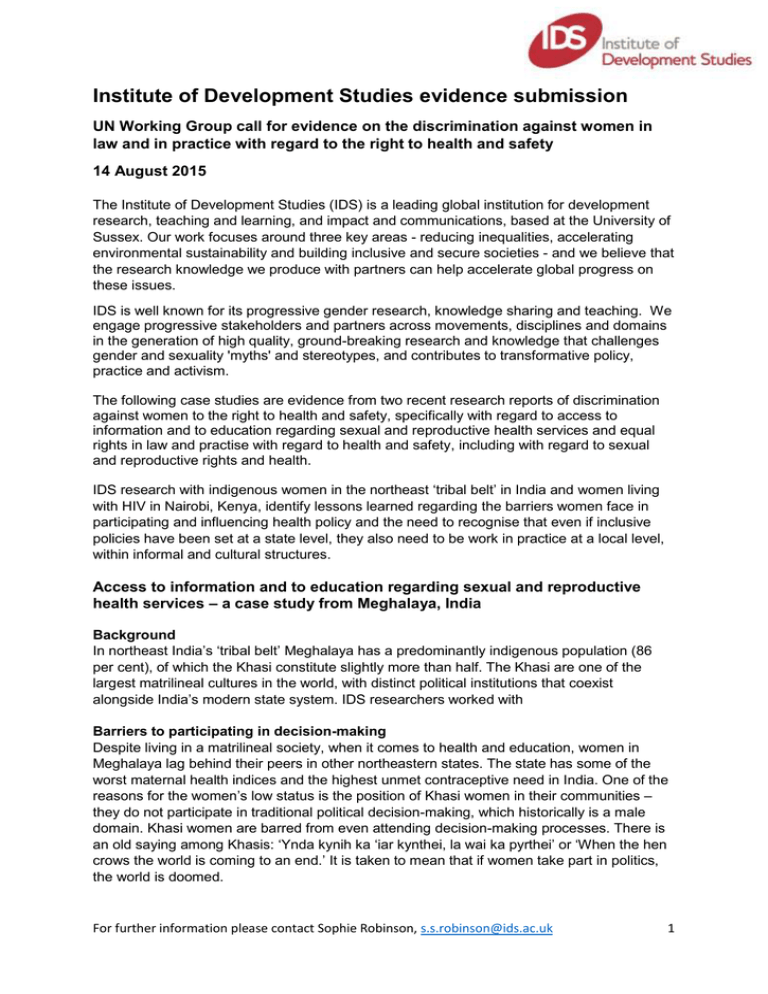
Institute of Development Studies evidence submission UN Working Group call for evidence on the discrimination against women in law and in practice with regard to the right to health and safety 14 August 2015 The Institute of Development Studies (IDS) is a leading global institution for development research, teaching and learning, and impact and communications, based at the University of Sussex. Our work focuses around three key areas - reducing inequalities, accelerating environmental sustainability and building inclusive and secure societies - and we believe that the research knowledge we produce with partners can help accelerate global progress on these issues. IDS is well known for its progressive gender research, knowledge sharing and teaching. We engage progressive stakeholders and partners across movements, disciplines and domains in the generation of high quality, ground-breaking research and knowledge that challenges gender and sexuality 'myths' and stereotypes, and contributes to transformative policy, practice and activism. The following case studies are evidence from two recent research reports of discrimination against women to the right to health and safety, specifically with regard to access to information and to education regarding sexual and reproductive health services and equal rights in law and practise with regard to health and safety, including with regard to sexual and reproductive rights and health. IDS research with indigenous women in the northeast ‘tribal belt’ in India and women living with HIV in Nairobi, Kenya, identify lessons learned regarding the barriers women face in participating and influencing health policy and the need to recognise that even if inclusive policies have been set at a state level, they also need to be work in practice at a local level, within informal and cultural structures. Access to information and to education regarding sexual and reproductive health services – a case study from Meghalaya, India Background In northeast India’s ‘tribal belt’ Meghalaya has a predominantly indigenous population (86 per cent), of which the Khasi constitute slightly more than half. The Khasi are one of the largest matrilineal cultures in the world, with distinct political institutions that coexist alongside India’s modern state system. IDS researchers worked with Barriers to participating in decision-making Despite living in a matrilineal society, when it comes to health and education, women in Meghalaya lag behind their peers in other northeastern states. The state has some of the worst maternal health indices and the highest unmet contraceptive need in India. One of the reasons for the women’s low status is the position of Khasi women in their communities – they do not participate in traditional political decision-making, which historically is a male domain. Khasi women are barred from even attending decision-making processes. There is an old saying among Khasis: ‘Ynda kynih ka ‘iar kynthei, la wai ka pyrthei’ or ‘When the hen crows the world is coming to an end.’ It is taken to mean that if women take part in politics, the world is doomed. For further information please contact Sophie Robinson, s.s.robinson@ids.ac.uk 1 Barriers to accessing health care Despite the close proximity of government-run Urban Health Centres and the availability of health insurance, some women living in slums reportedly hold back from seeking health care for fear of tallying up out-of-pocket expenses. The researchers found that women often deprioritise their own health in favour of supporting the needs of others. Many internalise notions of being second-class citizens, which prevents them from asserting their rights. Limited influence on sexual and reproductive health policies Despite the matrilineal family structures, some women are subordinate to spousal decision making when it comes to reproductive health. There is also limited awareness among women from the slums in the Meghalaya capital Shillong about availability of choices and possible health conditions when it comes to sexual and reproductive health. This lack of knowledge is reinforced by a scarcity of service provision for sexual and reproductive health. In general, people in the community are uncomfortable discussing these topics. Societal norms and notions of ‘good manners’, together with a lack of pertinent words in the Khasi language, contribute to the silence on sexuality within the community. One hurdle is the lack of appropriate words in the local language to discuss sexual and reproductive health. Out of a group of 32 participants (22 female and 15 male) from five different villages participated in the dissemination conducted at a village 75km outside of Shillong, most of the women participants reported of ending up with 7-10 children, though they were desirous of limiting to 3-4 children. Participants identified lack of knowledge on family planning as the main reason. “I used to hear people talk about family planning, I do not know how to do it. Some advices to go and ask the ASHA, but you know I feel shy and also I had to ask for the permission of my husband. Sometimes I don’t even have time to go to the dispensary (CHC Mawkyrwat) and I am not sick so I just leave it like that without asking”- Lay member of the community woman, village Gender inequalities were clearly in evidence in another participant group (12 female) from different parts of Shillong city. One participant shared her experience: “......my husband used to beat me and left me for another woman, he says the same line like what is being shown in the clip, “I can get many other women like you”. I have 5 children, you know, I wanted only 4 children but I got 5, after my fifth delivery I don’t want to bear children but in the hospital they were asking for my husband, for his consent. I know that if my husband’s permission is sought, he will never allow me, so I lied to the nurse saying that my husband is dead.” Lay member of the community- Female The role of traditional and indigenous governance systems Health planning in Meghalaya faces multiple challenges. The state lacks solid health-based statistics upon which public policymakers can design programmes and positive health outcomes. As a result, health planning is not based on community needs, especially from slum areas in Meghalaya. This potentially hides health inequalities between and within communities, and obscures poor people’s lack of access to health services. The status of women is particularly troubling. They have little input into developing policy and prioritising health needs in Meghalaya. Despite the Khasi being a matrilineal and matrilocal society, women are largely excluded from local indigenous political systems and processes. In the For further information please contact Sophie Robinson, s.s.robinson@ids.ac.uk 2 traditional institutions in Shillong, women have no representation in the dorbar nor are they allowed to attend dorbar meetings. The tradition of public politics and administration being a man’s domain is strongly embedded in the Khasi society. As a result, women’s views and perspectives are often not heard. Women reinforce their own exclusion by subordinating to a headman, who is also in many ways powerless in his relationship with the national government. The question is: when women’s voices are never heard, can their sexual and reproductive health and rights be a priority? Recommendations There needs to be more research on these dual governance systems (indigenous and state) and how they affect women’s right to health. Governance reforms need to work with both these traditional and indigenous and informal (such as slum lords and gang lords) governance systems and those of the state to recognise women’s rights, gender equality and non-discrimination with regard to their right to health and to safety. More specifically: Fund and improve research at sub-national/local levels on gender, governance and health to inform policy and programme decisions. Facilitate and improve transparent civil participation processes that engage with men and women as recommended in the National Urban Health Mission (NUHM). Use locally meaningful labels to replace the Hindi terms that are currently used when implementing central programmes. Develop feedback mechanisms between state and civil society, including women’s indigenous groups. Fund specific awareness/sensitising programmes on gender issues and gender inequalities that involve men in the health sector and other areas. Document women’s attitudes and voices on what constitutes empowerment within the indigenous cultural and governance context. Develop pilot programmes to improve governance processes for direct access by women to state benefits and services through indigenous and state institutions. Facilitate social audits of the health system and improve human capacity of civil society groups, including indigenous groups, for undertaking social audits, and monitoring and evaluation. Develop quality assurance Equal rights, in law and in practice, with regard to health and safety – a case study from Nairobi, Kenya Background Devolution of power to county governments that occurred as part of the adoption of a new Constitution in Kenya in 2010, saw counties oversee functions that were once the responsibility of the national government, including education and health care. Devolution potentially has wide-ranging implications for Kenya’s health sector, which is already failing on several levels. Despite a decrease in prevalence, Kenya still has one of the highest rates of HIV infection in the world and women in Kenya are disproportionately affected. Four years after the approval of the new Constitution, this case study examines: the difficulties that poor women and girls living in slum areas face in getting access to HIV services, including antiretroviral treatment (ART); their perception of how devolution has affected HIV and other health-related services; and their ability to participate in political decision-making and to bring about change at the local level. For further information please contact Sophie Robinson, s.s.robinson@ids.ac.uk 3 Lack of access to and utilisation of government health services The study was conducted with women, girls and health-care workers in 2014 in two large slums – Kibera and Majengo – in the capital Nairobi, which is one of the 47 administrative counties under the new Constitution. It is the most populous county, with the majority of people living in one of the more than 80 slums. The women and health-care workers raised concerns over a number of issues that affected their access to HIV-related services, which they would like to see changed. These issues included: (1) unavailability of HIV-related health services especially in terms of essential drug stock-outs and non-working CD4 cellcounting machines, leading to time-consuming referrals; (2) health-care workers not always respecting confidentiality; (3) lack of youthfriendly services – HIV-positive women in the study noted that a lack of youth-friendly services was a reason for young people not taking advantage of health-care services; (4) inconvenient opening hours and long waiting times in health facilities; (5) unintended negative effects of new programmes that aim to involve men but end up putting pressure on the women to produce a father and/or partner when they have none. A lack of equality at managerial levels Even though People Living with HIV (PLHIV) NGOs and networks may have a membership that is mostly female, they generally do not place HIV-infected women in decision-making managerial positions. This reflects a general exclusion of women from the political arena. Under the new Constitution, public participation has a central role, and devolution is a key factor in its promotion, with citizens supposed to have access to appropriate civic education programmes. However, one year after the introduction of devolution, low overall public participation in decision-making and governance was reported. HIV-positive women had no knowledge of civic education on public participation, and they had noticed little change since the passing of the new Constitution. Devolution, however, could be an opportunity for marginalised populations to start participating in various decentralised structures. HIV activists in Kenya have historically been successful in getting the attention of politicians. But poor women in slums face internal and external barriers to participation in the political arena, including: a lack of confidence and knowledge regarding how to engage policymakers; not knowing how the political system works, and not belonging to any networks; a lack of both income and time; and competing priorities. Increased barriers to political participation Women have been marginalised in the political arena as a result of gender norms and barriers. Politicians and policymakers are not easy to reach, as the researchers’ own experiences show. For HIV-positive women in slums – even if they are organised – these barriers to participation are considerably higher, not least because of practical constraints, such as a lack of time and money. Engaging with policymakers and bureaucrats in order to obtain services has been very difficult in Kenya for decades. Although devolution represents a positive move towards citizens becoming engaged, women still have to take active steps to get the attention of policymakers. Poor women in slum areas are excluded and marginalised. They have also internalised these views and do not see themselves as political activists who can effect political change. Mistrust of State run services Years of dysfunctional centralised governance has left them distrustful of the state. Instead, many rely on NGOs and community-based groups for social services, including ART. Now that international services are being downscaled or handed over to the State, it means they will be taken over by county-level departments. It is not clear what will happen to these For further information please contact Sophie Robinson, s.s.robinson@ids.ac.uk 4 services under devolution or how they will be viewed by clients, particularly women. HIV is just one of the many health challenges that face women and girls living in slums. As women in slums have never been very active in the leadership of the PLHIV organisations that operate at national level, because of gender and class barriers, they are not familiar with effective policy engagement. They lack the confidence, knowledge and resources, including time, to be politically active. Recommendations This case study is evidence of constitutional reforms failing to improve women’s access to HIV and reproductive health services in urban areas. From the lessons learnt from it, the following recommendations are put forward: Establish initiatives to enhance the participation of poor women and girls in the political arena, and recognise the broader internal and external barriers that prevent participation. Acknowledge the various ways in which women do organise themselves in informal and practical needs-oriented groups, and focus on helping women to access more resources, as well as providing training on governance and organisation. Coach and train county-level policymakers on management, including personal and professional time-management, while implementing public accountability mechanisms, which monitor the time that transactions take. Provide rewards for good public management, such as awards for reducing waiting times and red tape. For further information on each case study, please refer to the full reports: When the Hen Crows: Obstacles that Prevent Indigenous Women from Influencing Healthcare Policies – A Case Study of Shillong, Meghalaya, India, February 2015, Oosterhoff, P., Saprii, L., Kharlyngdoh, D. and Albert, S. Constitutional Reforms and Access to HIV Services for Women in Low-resource Settings in Nairobi, Kenya, June 2104, Oosterhoff, P. and Kageha Igonya, E. For further information please contact Sophie Robinson, s.s.robinson@ids.ac.uk 5
